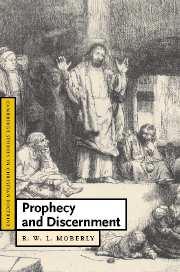Book contents
- Frontmatter
- Contents
- Preface
- List of abbreviations
- 1 What is prophecy, and can it be validated?
- 2 Jeremiah: the formulation of criteria for discernment
- 3 Micaiah ben Imlah: the costs of authenticity and discernment
- 4 Elisha and Balaam: the enabling and disabling of discernment
- 5 John: God's incarnate love as the key to discernment
- 6 Paul: cruciformity and the discernment of apostolic authenticity
- 7 Prophecy and discernment today?
- List of references
- Index of authors cited
- Index of scriptural references
- Index of subjects
3 - Micaiah ben Imlah: the costs of authenticity and discernment
Published online by Cambridge University Press: 05 May 2010
- Frontmatter
- Contents
- Preface
- List of abbreviations
- 1 What is prophecy, and can it be validated?
- 2 Jeremiah: the formulation of criteria for discernment
- 3 Micaiah ben Imlah: the costs of authenticity and discernment
- 4 Elisha and Balaam: the enabling and disabling of discernment
- 5 John: God's incarnate love as the key to discernment
- 6 Paul: cruciformity and the discernment of apostolic authenticity
- 7 Prophecy and discernment today?
- List of references
- Index of authors cited
- Index of scriptural references
- Index of subjects
Summary
‘Azarias’, I said: ‘You told me once I may find out who or what you worshipped when we got to Ecbatana. Might you tell me now?’ …
‘How would courage and truth and mercy and right action strike you?’
‘But those are not gods!’ I protested …
‘Tobias, for heaven's sake, what do you think a god looks like when he works in men?’
And to that I had no answer, so we hurried on without more talk towards Nineveh.
– Tobias and Azarias in salley vickers' Miss Garnet's Angel (vickers 2000:327–8)Introduction
Thus far I have sought to set out the criteria for discernment of prophetic authenticity as found in Jer. 23:9–22 within the wider context of Jeremiah 1–23. The appropriate next stage is to consider a narrative exemplification of these criteria. For many biblical narratives are constructed around the articulation of central theological issues, and a narrative can explore elements of the issue that may be less visible in other genres. An appropriate narrative should usefully test the thesis so far, and perhaps qualify and/or extend it in various ways.
The question is: Which narrative? At this point almost all biblical scholars, with a rare unanimity, opt for the story of Jeremiah and Hananiah (Jeremiah 28), as a story whose concern is ‘how could one tell a true prophet from a false one?’ (Bright 1965:202).
- Type
- Chapter
- Information
- Prophecy and Discernment , pp. 100 - 129Publisher: Cambridge University PressPrint publication year: 2006

